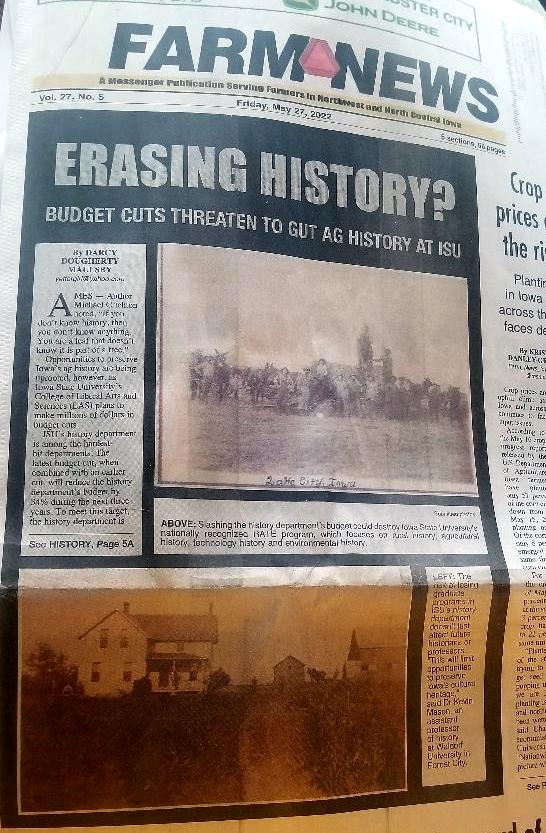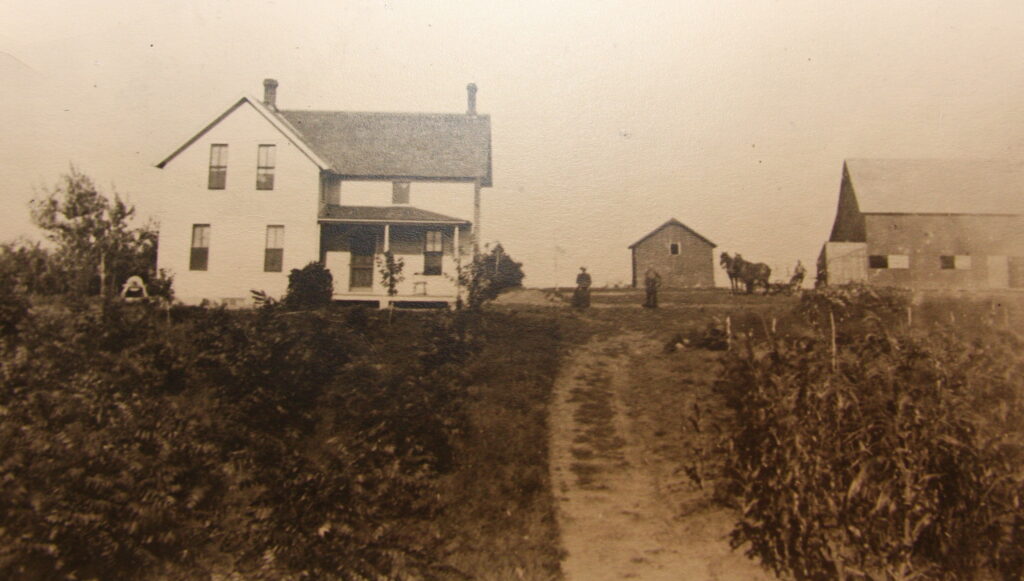
Erasing History? Budget Cuts Threaten to Gut Ag History at Iowa State University
Author Michael Crichton noted, “If you don’t know history, then you don’t know anything. You are a leaf that doesn’t know it is part of a tree.” Opportunities to preserve Iowa’s ag history are being uprooted, however, as Iowa State University’s (ISU) College of Liberal Arts and Sciences (LAS) plans to make millions of dollars in budget cuts.
ISU’s history department is among the hardest-hit departments. The latest budget cut, when combined with an earlier cut, will reduce the history department’s budget by 34% during the next three years. To meet this target, the history department is considering eliminating its graduate programs and search for further economies.
“The decisions made today influence the future,” said Michael M. Belding III, 31, a Ph.D. candidate studying rural, agricultural, technological, and environmental history at ISU. “I disagree with the budget cuts for ISU’s history department, because the people of Iowa deserve better.”
Belding has been gathering signatures to challenge these budget cuts, which would eliminate graduate programs in ISU’s history department.

Michael M. Belding III, a Ph.D. candidate studying rural, agricultural, technological, and environmental history at Iowa State University (ISU), has been gathering signatures to challenge severe budget cuts that would eliminate graduate programs in ISU’s history department.
He took action after Dr. Beate Schmittmann, LAS dean, announced a new round of budget cuts as part of her “Reimagining LAS” initiative. This is intended to “right-size” the budget in response to changing enrollment and student demand and “to position the college for future success,” according to ISU.
Slashing the history department’s budget will destroy ISU’s nationally-recognized RATE program, which focuses on rural history, agricultural history, technology history and environmental history. “If these proposed budget cuts occur, ISU is throwing away an innovative, important program,” noted Dr. Pamela Riney-Kehrberg, a distinguished professor of history at ISU.
If this happens, there will be long-lasting, negative impacts for Iowa, added Dr. Joe Anderson, a professor of history at Mount Royal University in Calgary, Alberta. “The Midwest has long been dynamic powerhouse of agriculture and innovation,” said Anderson, who earned his Ph.D. in history at ISU. “Everyone who cares about Iowa and its past should be mad as hell about ISU’s decision.”
Iowa’s ag heritage isn’t just for history majors
The risk of losing graduate programs in ISU’s history department doesn’t just affect future historians or professors. “This will limit opportunities to preserve Iowa’s cultural heritage,” said Dr. Kevin Mason, an assistant professor of history at Waldorf University in Forest City.
Not everyone who enrolls in history classes at ISU is a history major, added Mason, who received his Ph.D. in rural and environmental history from ISU in 2020. They include attorneys, engineers, architects and high school teachers who want to expand their knowledge of Iowa’s heritage. “If you care about Iowa history, you need to understand ag history.”
The only other university offering anything similar to ISU’s RATE program is Mississippi State University (MSU), although MSU focuses on Southern—not Midwestern—history. Neither the University of Iowa nor the University of Northern Iowa focus on ag/rural history, Riney-Kehrberg added.
“In most history courses and books, there’s little or no information on ag history following the Civil War,” noted Riney-Kehrberg, who researches American rural and agricultural history and will soon publish her latest book, When a Dream Dies: Agriculture, Iowa and the Farm Crisis of the 1980s. “The standard American history textbook might have one sentence about the Farm Crisis.”
The same dearth of information is evident when it comes to the role of women in agriculture. “There are many women’s studies courses today, but they often only teach the story of urban women, not rural women,” Riney-Kehrberg added.

“If these proposed budget cuts occur, ISU is throwing away an innovative, important program,” notes Dr. Pamela Riney-Kehrberg, a distinguished professor of history at Iowa State University.
History comes to life through the “land-grant land hunt”
While Yale University offers agrarian studies, it’s not the boots-on-the-ground style of research and extension that a land-grant university like ISU provides, Riney-Kehrberg noted.
Brandon Duxbury experienced this first-hand through the “land-grant land hunt” that ISU Extension undertook from 2014-2018. Contrary to popular belief, not a single acre of Story County land was given to Iowa State as part of the land-grant act (the Morrill Act) of 1862. Iowa was the first state to accept the provisions of the Morrill Act to build a college for the study of agriculture and the mechanical arts. Iowa Governor Samuel Kirkwood appointed Peter Melendy to select the best 210,000 acres of Iowa land to fund the new land-grant college. Most of this land was available in north-central and northwest Iowa.
Iowa became the first state to digitally map all these land-grant parcels within the state. Duxbury, a South Dakota native and graduate student in ISU’s history program, researched countless historical documents and interviewed current landowners to share their stories of their farmland. “People were always excited when we contacted them about this project,” said Duxbury, who is the new curator of collections at the Dacotah Prairie Museum in Aberdeen, South Dakota.
These stories, videos, a digital map and more can be found at www.landgrant.iastate.edu. “Efforts like this inspire people to ask better questions about the legacy they’re leaving with the land,” Duxbury said.
Making Iowa history relevant in ways like this is vital, said Belding, a Story City native who has links to his petitions on his Twitter account @mickey_belding. “I grew up thinking history involved big events that happened elsewhere, not here in Iowa. The more I research Iowa’s ag history, though, the more attached I get to Iowa.”

Family farms like this one near Yetter in Calhoun County have driven the economy in Iowa and the Midwest for generations. “The Midwest has long been dynamic powerhouse of agriculture and innovation,” says Dr. Joe Anderson, a professor of history at Mount Royal University in Calgary, Alberta, who earned his Ph.D. in history at Iowa State University (ISU). “Everyone who cares about Iowa and its past should be mad as hell about ISU’s decision.”
Teaching history prepares students for success
Along with researching and preserving Iowa history, ISU’s history department helps students develop a broad skill set, including communication. “My dad was a computer programmer who was promoted to management,” Riney-Kehrberg said. “He always emphasized that reading, writing and speaking skills were essential for a successful career.”
History classes also teach students research skills, data analysis and critical thinking. “You have to make an argument, and then find facts to support this argument,” Riney-Kehrberg said. “All this requires you to think carefully and broadly.”
Studies show that students with a solid LAS education, including history, have some of the best outcomes five years after college graduation. “These graduates tend to make more money, are the least likely to be fired, are less likely to move back home to live with their parents and are more likely to be promoted,” said Anderson, citing sources like the 2018 report “Humans Wanted: The Coming Skills Revolution,” published by the Royal Bank of Canada. “We’re very short-sighted as a culture if we devalue skills that come from studying the humanities.”
The “soft skills” of how people communicate with each other, interact with colleagues and solve problems are just as important to workplace readiness and employability as hard skills, especially as technology evolves. “It doesn’t take a ‘George Jetson’ moment to imagine a day when artificial intelligence and other technologies will replace some of the jobs we currently train people for,” Anderson, who served as director of history and interpretation at Living History Farms in Urbandale in the 1990s. “Our society will always need people who are skilled in human connection and communication.”
Society also needs educated citizens, both rural and urban, with a solid understanding of agricultural history, Anderson added. “People who are trained in ISU’s history department often go on to run museums in Iowa and the Midwest, teach at community colleges like DMACC or Hawkeye Community College, teach at land-grant universities, or pursue a variety of other careers.”
Everywhere they go, these professionals take Iowa history with them, noted Anderson, a south-central Nebraska native who loved spending time on his grandparents’ farms in Missouri and Iowa. He often incorporates Midwestern history into the classes he teaches in Canada. “This perspective helps people better understand many pressing issues today, from water quality to food production.”
Integrating history with tourism, economic development
It’s essential to be open to new ways of making Iowa history relevant to a wider audience, Mason said. “I believe history departments, especially at a land-grant like ISU, can collaborate across academic disciplines to help create a more diversified economy that encourages young people to stay in Iowa.”
Mason, who grew up in Pella, saw how Iowa history was intertwined with job creation, economic development and tourism in his hometown. “Tradition is important in Pella. Honoring this heritage helps young people gain a sense of place and the sense of pride that comes from knowing their history.”
Anyone who is concerned about the proposed funding cuts to ISU’s history department should contact their state legislators, the Board of Regents, and Dr. Beate Schmittmann, dean of the College of LAS at ISU. It’s important to take action now, Duxbury said. “The loss of ISU’s graduate history programs is a loss to Iowa history. Fighting these drastic cuts is a battle worth fighting.”
Note: I wrote this article for Farm News. It first appeared in the Friday, May 27, 2022, edition of Farm News. I’ve had a number of people ask me what they can do to fight these budget cuts. First, if you’re an Iowan, contact the senator and representative who represent you at the state level in the Iowa legislature. Also, contact leaders at ISU, including:
Iowa State University
Attn. Dr. Beate Schmittmann
202 Catt
2224 Osborn Dr.
Ames IA 50011-4009
Iowa State University
Office of the President, Dr. Wendy Wintersteen
515 Morrill Road
1750 Beardshear Hall
Ames, IA 50011
Want more?
I invite you to read more of my blog posts if you value intriguing Iowa stories and history, along with Iowa food, agriculture updates, recipes and tips to make you a better communicator.
If you’re hungry for more stories of Iowa history, check out my top-selling “Culinary History of Iowa: Sweet Corn, Pork Tenderloins, Maid-Rites and More” book from The History Press. Also take a look at my other books, including “Iowa Agriculture: A History of Farming, Family and Food” from The History Press, “Madison County,” “Dallas County” and “Calhoun County” book from Arcadia Publishing. All are filled with vintage photos and compelling stories that showcase the history of small-town and rural Iowa. Click here to order your signed copies today! Iowa postcards are available in my online store, too.
If you like what you see and want to be notified when I post new stories, be sure to click on the “subscribe to blog updates/newsletter” button at the top of this page, or click here. Feel free to share this with friends and colleagues who might be interested, too.
Also, if you or someone you know could use my writing services (I’m not only Iowa’s storyteller, but a professionally-trained journalist with 20 years of experience), let’s talk. I work with businesses and organizations within Iowa and across the country to unleash the power of great storytelling to define their brand and connect with their audience through clear, compelling blog posts, articles, news releases, feature stories, newsletter articles, social media, video scripts, and photography. Learn more at www.darcymaulsby.com, or e-mail me at yettergirl@yahoo.com.
Let’s stay in touch. I’m at darcy@darcymaulsby.com, and yettergirl@yahoo.com.
Talk to you soon!
Recent Posts
- Do Press Releases Still Work?
- Erasing History? Budget Cuts Threaten to Gut Ag History at Iowa State University
- Machines that Changed America: John Froelich Invents the First Tractor in Iowa
- Bob Feller on Farming, Baseball and Military Service
- Classic Restaurants of Des Moines: A Taste of Thailand Served the "Publics" and Politics
- Want to Combat Fake News? Become a Better Researcher
Categories
- Achitecture
- Agriculture
- Architecture
- baking
- barbeque
- Barn
- breakfast
- Business
- Communication Tips
- Conservation
- content
- cooking
- Crime
- Dallas County
- Economical
- Farm
- Featured
- Food
- Food history
- health
- Iowa
- Iowa food
- Iowa history
- marketing
- Photography
- Recipes
- Seasonal
- Small town
- Storytelling
- Uncategorized
- writing
Archive by year
- 2023
- 2022
- 2021
- 2020
- When Agriculture Entered the Long Depression in the Early 1920s
- The Corn Lady: Jessie Field Shambaugh and the Birth of 4-H in Iowa
- Sauce to Sanitizer: Cookies Food Products Bottles Hand Sanitizer Made with Ethanol
- Myth Busting: No, Your Pork Doesn't Come from China
- Long Live Print Newsletters! 5 Keys to Content Marketing Success
- Shattering Silence: Farmer Helped Slave Find Freedom and Racial Equality in Iowa
- Meet Iowa Farmer James Jordan, Underground Railroad Conductor
- George Washington Carver Rose from Slavery to Ag Scientist
- Remembering the African-American Sioux City Ghosts Fast-Pitch Softball Team
- Want to Combat Fake News? Become a Better Researcher
- Classic Restaurants of Des Moines: A Taste of Thailand Served the "Publics" and Politics
- 2019
- The Untold Story of Iowa’s Ag Drainage Systems
- Stop Rumors Before They Ruin Your Brand
- Finding Your Voice: The Story You Never Knew About "I Have a Dream"
- Warm Up with Homemade Macaroni and Cheese Soup
- Can a True Story Well Told Turn You into a Tom Brady Fan?
- Baking is for Sharing: Best Bread, Grandma Ruby’s Cookies and Other Iowa Favorites
- 4 Key Lessons from Bud Light’s Super Bowl Corn-troversy
- Could Your Story Change Someone’s Life?
- What To Do When the Travel Channel Calls
- Tex-Mex Sloppy Joes and the Magic of Maid-Rite in Iowa
- How Not to Invite Someone to Your Next Event--and 3 Solutions
- We Need FFA: Iowa Ag Secretary Mike Naig Reflects on His FFA Experiences
- From My Kitchen to Yours: Comfort Food, Conversation and Living History Farms
- Smart Marketing Lessons from an Uber Driver--Listen Up!
- Hog Trailers to Humidors: Two New Iowa Convenience Stores Reflect “Waspy’s Way”
- A Dirty Tip to Make Your Social Media Content More Shareable
- Are You on Team Cinnamon Roll?
- Senator Grassley on Farming: Any Society is Only Nine Meals Away From a Revolution
- Why We Should Never Stop Asking Why
- What’s the Scoop? Expanded Wells’ Ice Cream Parlor Offers a Taste of Iowa
- Independence, Iowa’s Connection to the Titanic and Carpathia
- Memories of Carroll County, Iowa, Century Farm Endure
- Iowa's “Peacemaker Pig” Floyd of Rosedale Helped Calm Racial Tensions
- 2018
- How to Cook a Perfect Prime Rib
- How Did We Get So Rude?
- Mmm, Mmm Good: Soup’s on at the Rockwell City Fire Department
- Quit Using “Stupid Language”
- In Praise of Ham and Bean Soup
- Recalling a Most Unconventional—and Life-Changing--FFA Journey
- Events Spark Stories That Help Backcountry Winery Grow in Iowa
- Sac County Barn Quilt Attracts National Attention
- Doing Good, Eating Good at Lytton Town Night
- Young Entrepreneur Grows a Healthy Business in Small-Town Iowa
- Digging Deeper: Volunteers Showcase Thomas Jefferson Gardens in Iowa
- How to Tell Your Community’s Story—with Style!
- DNA Helps Sailor Killed at Pearl Harbor Return to His Family
- It’s Time to Be 20 Again: Take a Road Trip on Historic Highway 20
- The Biggest Reason You Shouldn’t Slash Your Marketing Budget in Tough Times
- Are You Telling a Horror Story of Your Business?
- Pieced Together: Barn Quilt Documentary Features Iowa Stories
- Unwrapping Storytelling Tips from the Candy Bomber
- Barn Helped Inspire Master Craftsman to Create Dobson Pipe Organ Builders
- Butter Sculptures to Christmas Ornaments: Waterloo Boy Tractor Celebrates 100 Years
- Ag-Vocating Worldwide: Top 10 Tips for Sharing Ag’s Story with Consumers
- 2017
- Growing with Grow: Iowa 4-H Leader Guides 100-Year-Old 4-H Club for 50 Years
- High-Octane Achiever: Ethanol Fuels New Driver Tiffany Poen
- Shakespeare Club Maintains 123 Years of Good Taste in Small-Town Iowa
- Iowa’s Ice Queen: Entrepreneur Caroline Fischer’s Legacy Endures at Hotel Julien Dubuque
- Darcy's Bill of Assertive Rights: How to Communicate and Get What You Need
- Celebrating Pi Day in Iowa with Old-Fashioned Chicken Pot Pie
- Cooking with Iowa’s Radio Homemakers
- Top 10 Tips to Find the Right Writer to Tell Your Company’s Stories
- The “No BS” Way to Protect Yourself from Rude, Obnoxious People
- Learning from the Land: 9 Surprising Ways Farmers Make Conservation a Priority
- Leftover Ham? Make This Amazing Crustless Spinach and Ham Quiche
- Iowa’s Lost History from the Titanic
- Coming Soon--"Dallas County," a New Iowa History Book!
- How to Clean a Burned Pan in 6 Simple Steps
- Iowa Beef Booster: Larry Irwin Takes a New Twist on Burgers
- Get Your Grill On: How to Build a Better Burger
- "Thank God It’s Over:" Iowa Veteran Recalls the Final Days of World War 2
- How to Thank Veterans for Their Military Service
- Imagine That! Writers, Put Your Reader Right in the Action
- Remembering Ambassador Branstad’s Legacy from the 1980s Farm Crisis in Iowa
- Busting the Iowa Butter Gang
- Lightner on Leadership: “Everyone Has Something to Give”
- Show Up, Speak Up, Don’t Give Up
- Small - Town Iowa Polo Teams Thrilled Depression - Era Crowd
- Ethanol:Passion by the Gallon
- Cruising Through Forgotten Iowa History on Lincoln Highway
- Why I'm Using a Powerful 500-Year-Old Technology to Make History--And You Can, Too
- 5 Ways a “History Head” Mindset Helps You Think Big
- Behind the Scene at Iowa's Own Market to Market
- Let’s Have an Iowa Potluck with a Side of History!
- Iconic State Fair Architecture: Historic Buildings Reflect Decades of Memories
- Iconic State Fair Architecture- Historic Buildings Reflect Decades of Memories
- Iowa Underground - How Coal Mining Fueled Dallas County's Growth
- Ultra-Local Eating: Jennifer Miller Guides CSA, Iowa Food Cooperative
- The Hotel Pattee and I are Hosting a Party—And You’re Invited!
- Tell Your Story—But How?
- Mediterranean Delights: Iowa Ag Influences Syrian-Lebanese Church Dinner
- 6 Steps for More Effective and Less Confrontational Conversations
- 6 Steps for More Effective and Less Confrontational Conversations!
- 6 Ways to Motivate Yourself to Write—Even When You’re Not in the Mood
- Always Alert-How to Stay Safe in Any Situation
- Does Accuracy Even Matter Anymore?
- Soy Power Shines at Historic Rainbow Bridge
- Free Gifts! (Let’s Talk Listening, Stories and History)
- 2016
- How to Connect with Anyone: Lessons from a Tornado
- Soul Food: Lenten Luncheons Carry on 45-Year Iowa Tradition
- Top 3 Tips for Writing a Must-Read Article
- Darcy's Top 10 Tips to Better Writing
- Top 8 Tips for Building a Successful Freelance Business
- 10 Steps to Better Photos
- Reinventing the Marketer of 2010
- Extreme Writing Makeover
- My Top Social Media Tips for Farmers: REVEALED!
- Honoring the Legacy of Rural Iowa's Greatest Generation
- Iowa's Orphan Train Heritage
- Dedham’s Famous Bologna Turns 100: Kitt Family Offers a Taste of Iowa History
- Iowa Barn Honors Pioneer Stock Farm
- Darcy's Top 10 Tips for Better Photos
- Soup and Small-Town Iowa Spirit
- Savoring the Memories: Van's Café Served Up Comfort Food for Six Decades
- Mayday, Mayday—The Lost History of May Poles and May Baskets in Iowa
- Iowa's Vigilante Crime Fighters of the 1920s and 1930s
- Very Veggie: Iowan's Farm-Fresh Recipes Offer Guilt-Free Eating
- Iowa Public TV's "Market to Market" Features Expedition Yetter, Agri-Tourism, Des Moines Water Works' Lawsuit
- 62 Years and Counting: Calhoun County, Iowa, Families Maintain 4th of July Picnic Tradition
- “A Culinary History of Iowa” Satisfies: Iowa History Journal Book Review
- For the Love of Baking: Lake City's Ellis Family Showcases Favorite Iowa Farm Recipes (Caramel Rolls, Pumpkin Bars and More!)
- Remembering Sept. 11: Iowa Community’s Potluck Honors America
- Talking Iowa Food and Culinary History on Iowa Public Radio
- Talking "Stilettos in the Cornfield," Taxes, Trade and More on CNBC
- FarmHer #RootedinAg Spotlight--FFA Attracts More Women to Careers in Ag
- Rustic Cooking Refined: Iowan Robin Qualy Embraces Global Flavors
- Voice of Reason: Iowa Pork Producer Dave Struthers Offers Top 10 Tips to Speak Up for Ag
- Iowa Eats! Why Radio Iowa, Newspapers and Libraries are Hungry for "A Culinary History of Iowa"
- Iowa Turkeys Carry on National Thanksgiving Tradition
- Riding with Harry: 2016 Presidential Election Reflects Truman's Iowa Revival at 1948 Plowing Match in Dexter
- All Aboard! Rockwell City’s “Depot People” Offer a Taste of Iowa History
- Is This Iowa's Favorite Appetizer?
- O, Christmas Tree! Small Iowa Towns Celebrate with Trees in the Middle of the Street
- Slaves Escaped Through Dallas County on Iowa’s Underground Railroad
- Adel Barn Accents Penoach Winery in Iowa
- Celebrating New Year's Eve in Style at a Classic Iowa Ballroom
